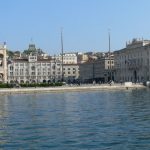
Former White House chief strategist Steve Bannon’s plans for a far-right nationalist school have been halted by Italian authorities. Bannon hoped to run the school out of an ancient monastery near Rome, but officials say they are revoking rights to the grounds for failure to maintain the site and pay fees.
In a statement released Friday, Gianluca Vacca, an official with Italy’s cultural ministry, said that it was the government’s “duty” to revoke the rights to the Certosa de Trisulti monastery that the Human Dignity Institute, a far-right Catholic think tank that Bannon partnered with, had obtained. Vacca cited the fact the group failed to pay proper concessions and said it was determined that the institute did not have any experience in cultural heritage custodianship. The ministry also voiced concerns that repairs had not begun that would make the historic property available for public use.
“Political opinions have nothing to do with us,” Vacca said. “We are interested in respecting the law and protecting the national cultural heritage, of which the Certosa is obviously part.”
Bannon, who once served as President Trump’s chief strategist, had hoped to train mid-career students “looking to do something different” in the rhetoric and strategy of far-right nationalism at the school. He promised the monastery would become a “gladiator school” and planned to call it the “Academy for the Judaeo-Christian West.”
In response to the Italian government’s statement, Bannon signaled that he is not ready to give up on his dream of opening the school and said, “The fight for Trisulti is a microcosm of the fight for the Judeo-Christian West.”
Further complicating Bannon’s plans is the assertion by Italian authorities that a bank document the Human Dignity Institute submitted in acquiring rights to use the monastery had been forged.
Bannon has rejected this accusation, claiming that “everything actually is totally legitimate” and that questions over the authenticity of the bank document “is just dust being kicked up by the left.”
Bannon hoped to create a global school for nationalist thought
Bannon hoped to use the planned school to create a legacy of populist teachings rooted in his own personal alt-right philosophies of governance.
“Will we teach the underpinnings of populism and nationalism? Yeah, absolutely,” Bannon told the Washington Post after the Human Dignity Institute won its bid to occupy the monastery for $111,000 a year. “But also a broader range of stuff. The trends of where we think the world is going.”
From the beginning, however, locals were opposed to the monastery, which features frescoes dating to the 18th century and priceless art, being used for political purposes by foreign operatives.
“Almost everybody is against this,” Mauro Bussiglieri, the mayor of a town near the monastery, said. “Citizens are having a hard time understanding that the [monastery] is going to be a place where future politicians are going to be trained. They keep looking at it as a religious place, and that’s it.”
Members of the Human Dignity Institute, a Catholic think tank led by Bannon ally and British political operative Benjamin Harnwell, have also taken issue with using the monastery for anything other than religious study.
Cardinal Renato Maria Martino, a one-time honorary president of Human Dignity Institute, wrote a letter to Harnwell advising him not to use the grounds for political purposes.
“I recommend you to make sure the abbey is really turned into a place for worship and meeting open to everybody,” Martino wrote, according to Politico. “I really hope you and [the Human Dignity Institute] succeed in carrying out the project without any distortions or modifications, including in its implementation phase, that will degenerate the purposes you have worked for so hard.”
Harnwell vowed to fight to hold onto the lease Friday.
Bannon headed to Europe after falling out of favor with the president following reports that he’d said Donald Trump Jr.’s contact with Russian agents was “treasonous” and that Trump firing FBI Director James Comey was the biggest mistake in “modern political history.”
European far-right leaders including France’s Marine Le Pen and Italy’s Matteo Salvini welcomed Bannon’s expertise, although he was still met with some skepticism from conservative groups suspicious of American influence in European politics. Nevertheless, Bannon plans to remain an influence on the continent’s politics, and will join Harnwell in launching an official appeal of the Italian government’s decision.
Posts from the same category:
- None Found









